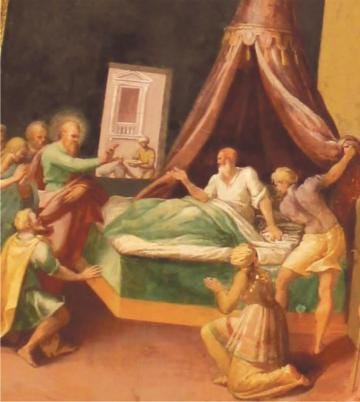A Study of Acts: Healings on Malta
Acts 28:7-10 - Malta becomes one of the first Christian countries in Europe because of the time spent there by Paul and his friends.
“There was an estate nearby that belonged to Publius, the chief official of the island. He welcomed us to his home and showed us generous hospitality for three days. His father was sick in bed, suffering from fever and dysentery. Paul went in to see him and, after prayer, placed his hands on him and healed him. When this had happened, the rest of the sick on the island came and were cured. They honored us in many ways; and when we were ready to sail, they furnished us with the supplies we needed.”
Acts 28:7-10 NIV
In my last devotional, I mistakenly said that this devotional would be about the healing of Publius. It was the healing of Publius’ father that took place (I knew that, but I wrote the blurb at the bottom too quickly and missed the mistake during review).
There was an estate nearby where the group landed on Malta that belonged to Publius. He was the chief official of the island. He welcomed them into his home (this was probably a small subset of the total people that survived the shipwreck, and it included Paul, the centurion Julius, Luke, and probably Aristarchus). Publius showed them generous hospitality during this time. His father was sick in bed, suffering from fever and dysentery (not fun). Paul went in to see the father and, after prayer, placed his hands on him and healed him.
Note the sequence that Paul follows: He goes to the ailing person, he prays, then he places his hands on him and heals him. So who was Publius? He is the patron saint of Malta! Here’s a backstory about him from Wikipedia:
Saint Publius (Maltese: San Publju; Ancient Greek: Πούπλιος) was a 1st century Christian bishop and saint. He is considered the first Bishop of Malta and one of the first Bishops of Athens.
Publius is Malta's first canonisedsaint, who is described in the Book of Acts as the 'chief' or prince of the island (Maltese: il-prinċep tal-gżira). According to Maltese Christian tradition, Publius' conversion led to Malta being the first Christian nation in the West.
He is venerated as a saint in the Eastern Orthodox Church and Roman Catholic Church, with feast days on 13 March and 22 January respectively.
So, by no coincidence (are there any with God?), the group is forced to stay in Malta until more favorable weather appears for a departure and the islanders, starting with Publius, are converted to Christianity! God used this opportunity for a crossroads island in the Mediterranean to become a place of His Word and His salvation. I can say with assurance that Malta is still a very Christian place. Here are some pictures of the Sanctuary Basilica of the Assumption of our Lady, a Roman Catholic Church that we toured when we visited Malta in 2018. This church, with its huge dome, was nearly destroyed during a bombing attack by the Germans during WWII but the bomb didn’t explode (the parishioners consider that a miracle); photos are copyright © 2018, 2025 Steven and Barbara Sande.
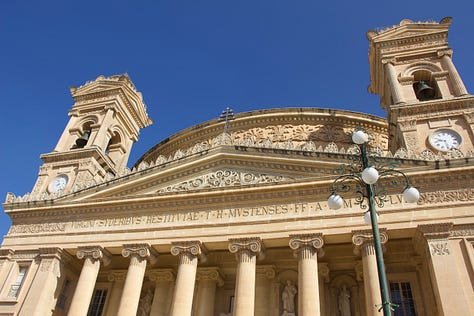
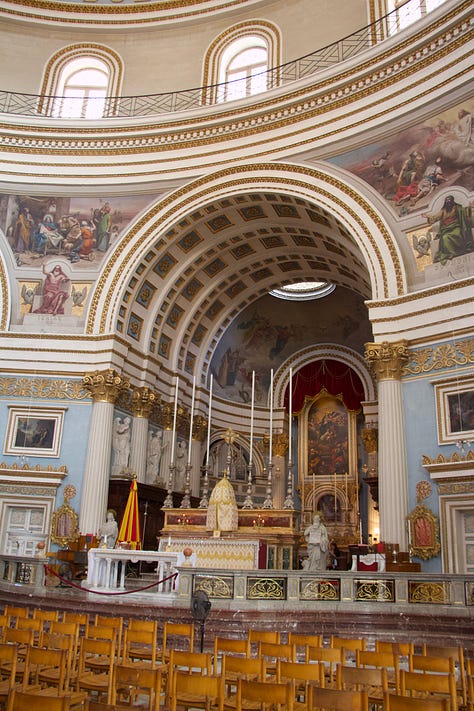
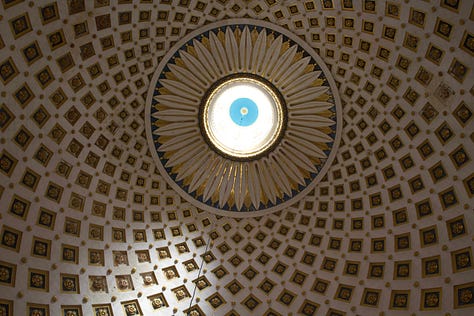
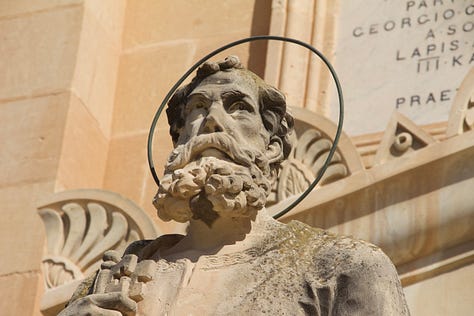
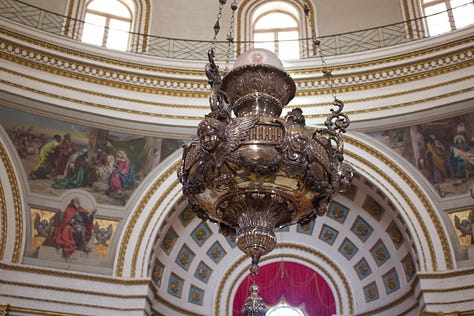
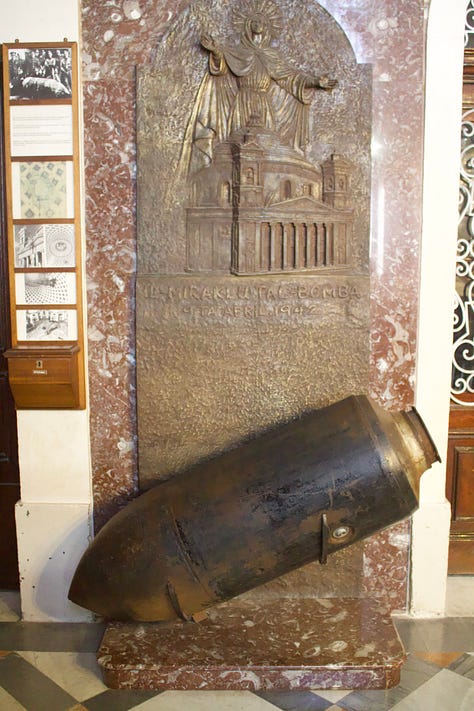
After the father is healed, the word spreads quickly and many others (the scripture says “all others”) who were sick on the island came and were cured. The natives honored Paul and his group in many ways and gave them the supplies they needed when they were ready to depart. The healings were from God through Paul and observed by a physician, Luke. God used Paul to demonstrate His power and His love to the people of Malta.
I find this commentary by Chuck Swindoll, quoted on Precept Austin, to be quite compelling, demonstrating the risks of thinking that healing is always going to occur (the emphasis in the commentary is from Precept Austin):
The word translated “healed” is the Greek term iaomai, which usually refers to instantaneous healing. An on-the-spot miracle, if you please. Of course, Paul was not the source of such power, only the vehicle, the human instrument through whom God supernaturally worked. I am as impressed with Dr. Luke’s lack of envy as I am with the apostle Paul’s spiritual gift. The physician stepped aside. Although we may be certain his medical training left him little or no room for divine miracles, his theology did!
Without a moment’s hesitation the professional was willing to stand back and watch God do the unusual. By the way, that last word is worth repeating for emphasis— an on-the-spot miracle is unusual, an exception to the general rule. For too long people have been led to believe that virtually in every case they can “expect a miracle.” And to make matters worse, when the miracle doesn’t occur, they are told that something is wrong with them, they are harboring sin, they are not strong enough in their faith . . . and on and on. This idea of “instant healing” confuses multitudes today. Sufferers are promised miracles by many alleged healers— some sincere, some naïve, some professional con artists—and when the miracle fails to materialize, great damage is done. The fallout is always tragic and occasionally irreparable. Let’s understand that there are times when God does indeed heal. Instantly. Miraculously. Inexplicably. But such miracles are rare—unusual exceptions to the rule—and they remind us that the One who made us certainly has the power to mend our physical bodies. (Start Where You Are).
God can heal anyone, anywhere and at any time. I believe He healed Steve’s cervical stenosis a few years ago because the pain and the stiffness that he had for years are completely gone. But when churches start to rely on alleged healings to draw in more congregants, then they are courting a disaster when many are not healed or the relief is only temporary. This is definitely an area of controversy.
My next devotional examines Acts 28:11-16, the group travels to Rome.
Heaven on Wheels Daily Prayer:
Dear Lord - I believe that You can heal anyone at any time. However, I also believe that healings are not common or widespread and the actions can be used to mislead believers. I thank You for healing Steve. I also thank You for the opportunity we had to see a little bit of the island of Malta on our travels. Amen.
Scripture quotations taken from the (NASB®) New American Standard Bible®, Copyright © 1960, 1971, 1977, 1995 by The Lockman Foundation. Used by permission. All rights reserved. lockman.org
Precept Austin was accessed on 2/21/2025 to review commentary for Acts 28:7-10.



